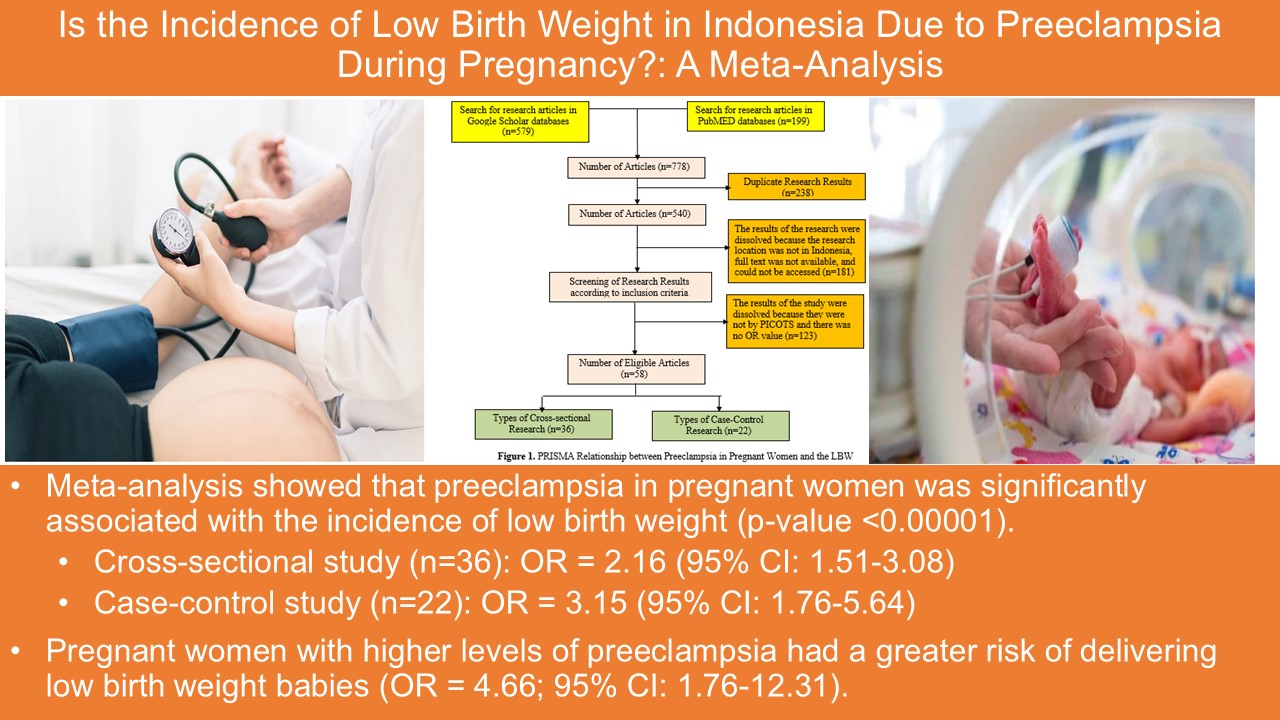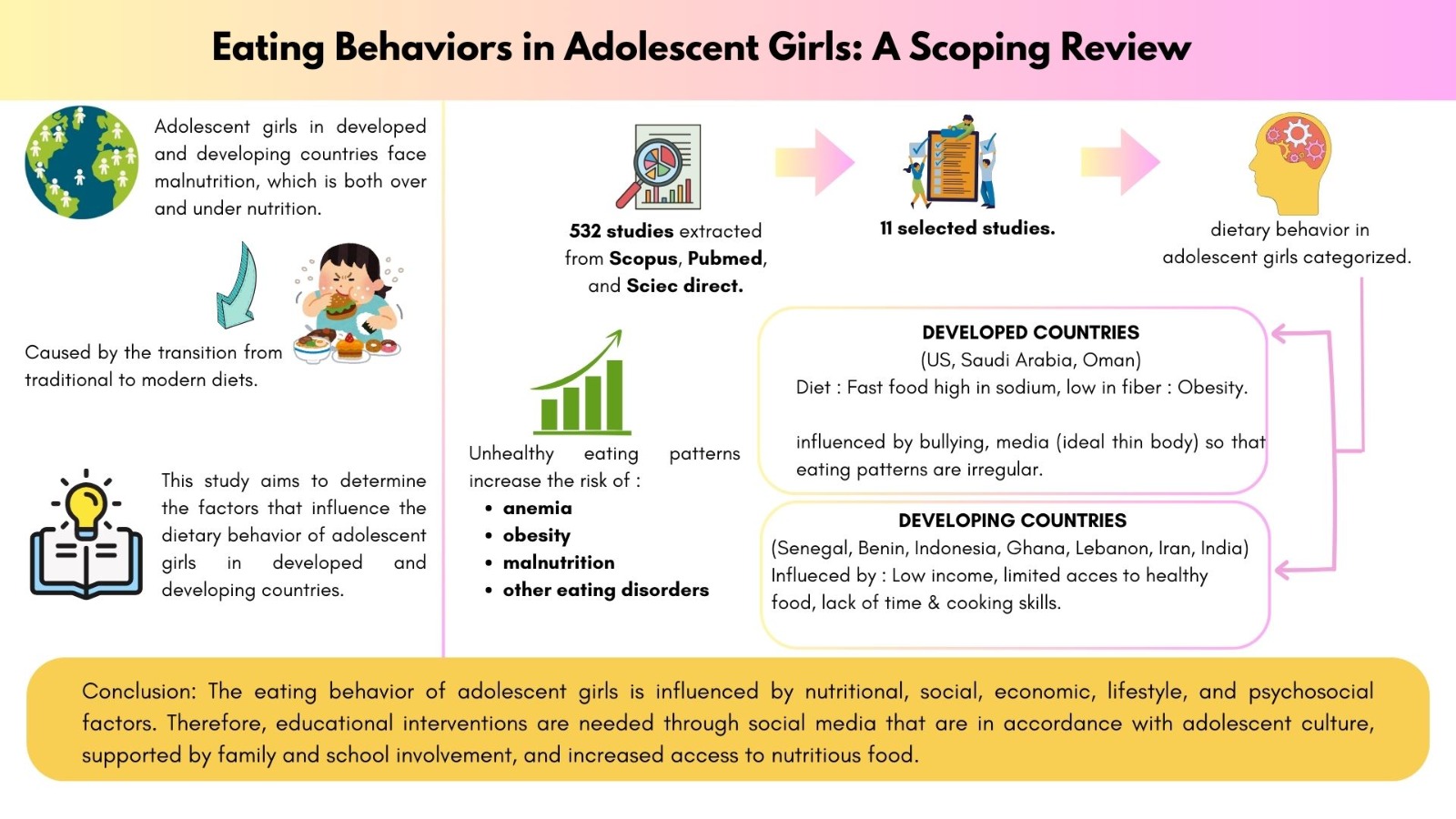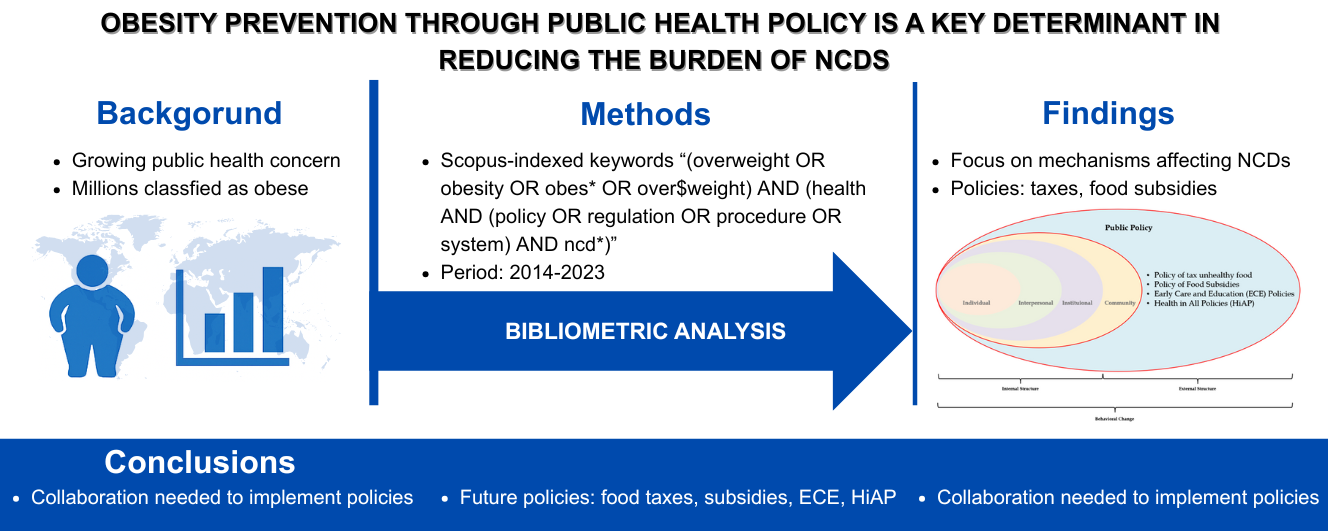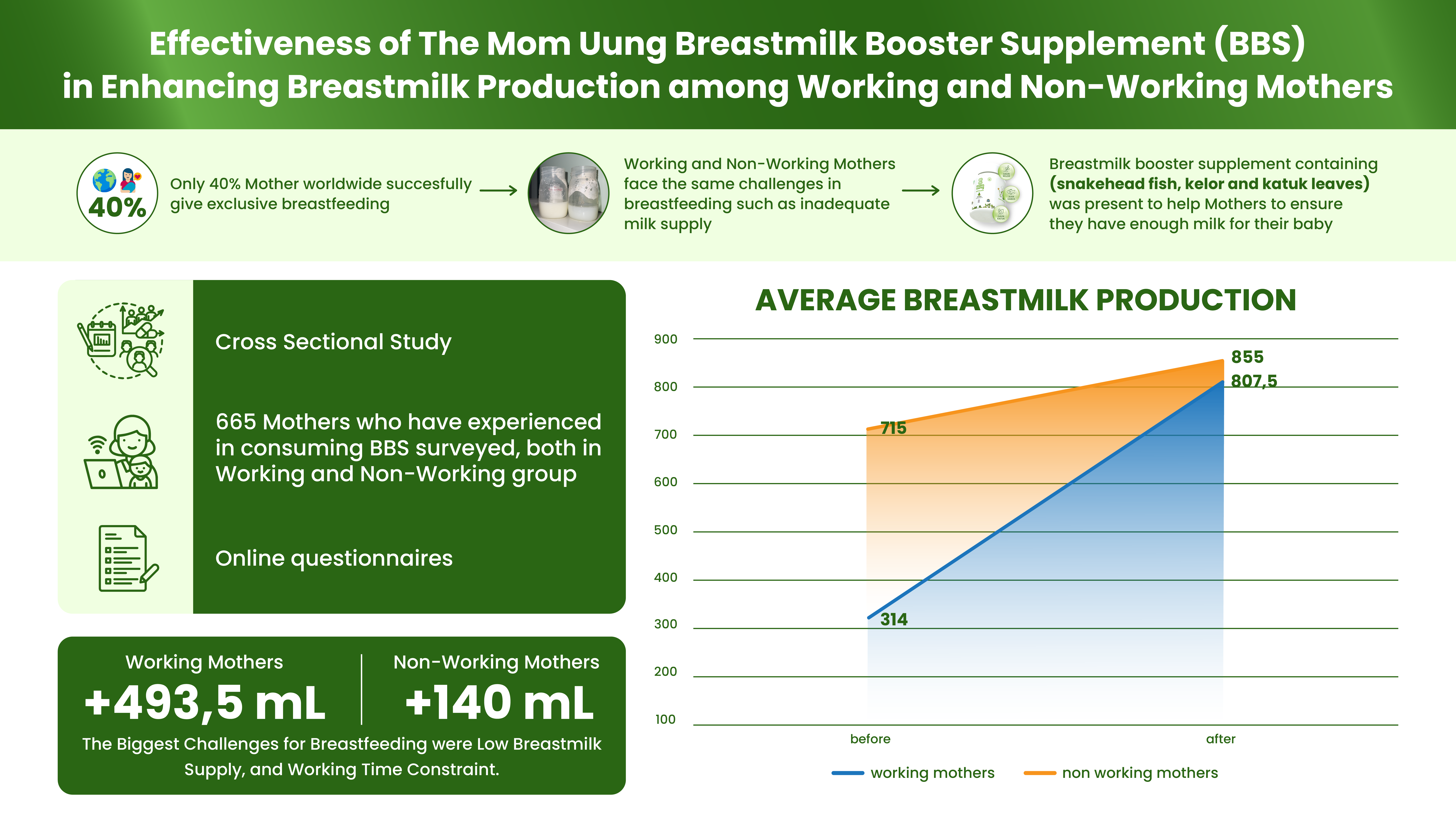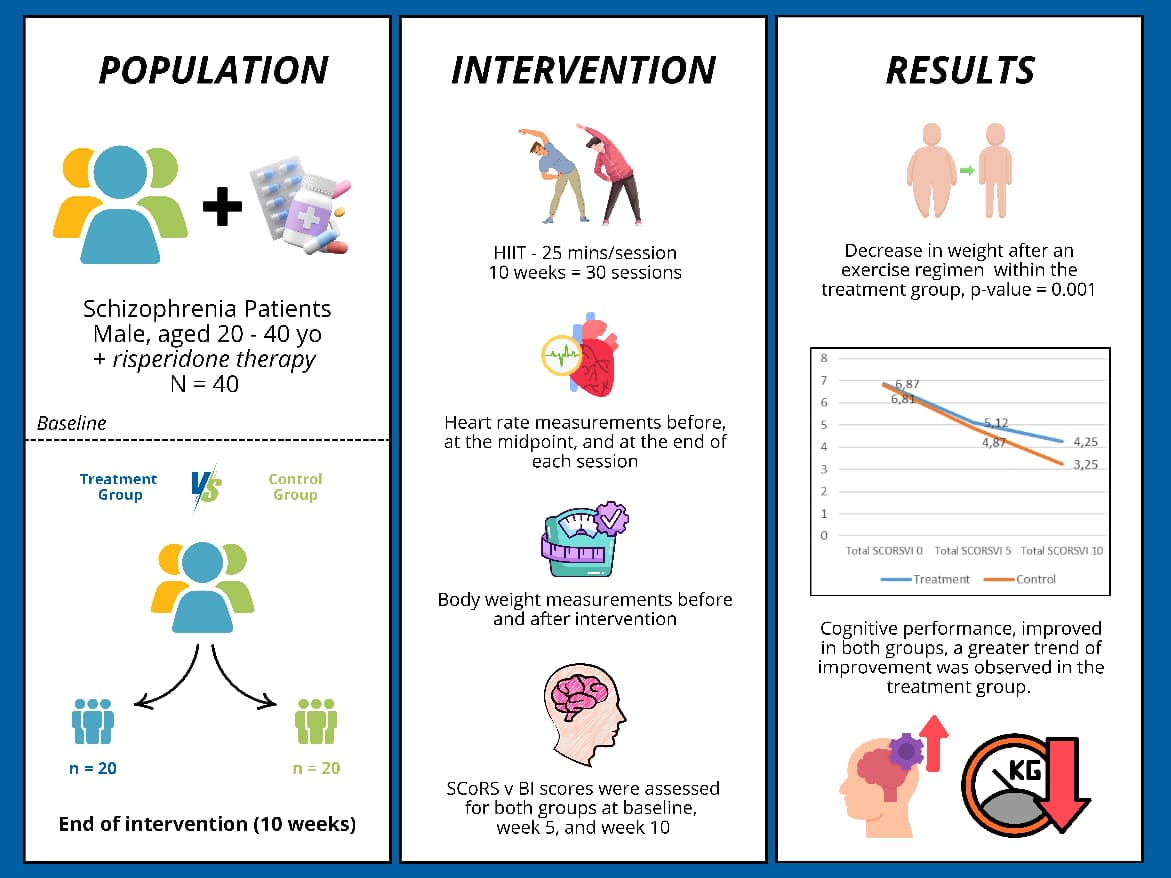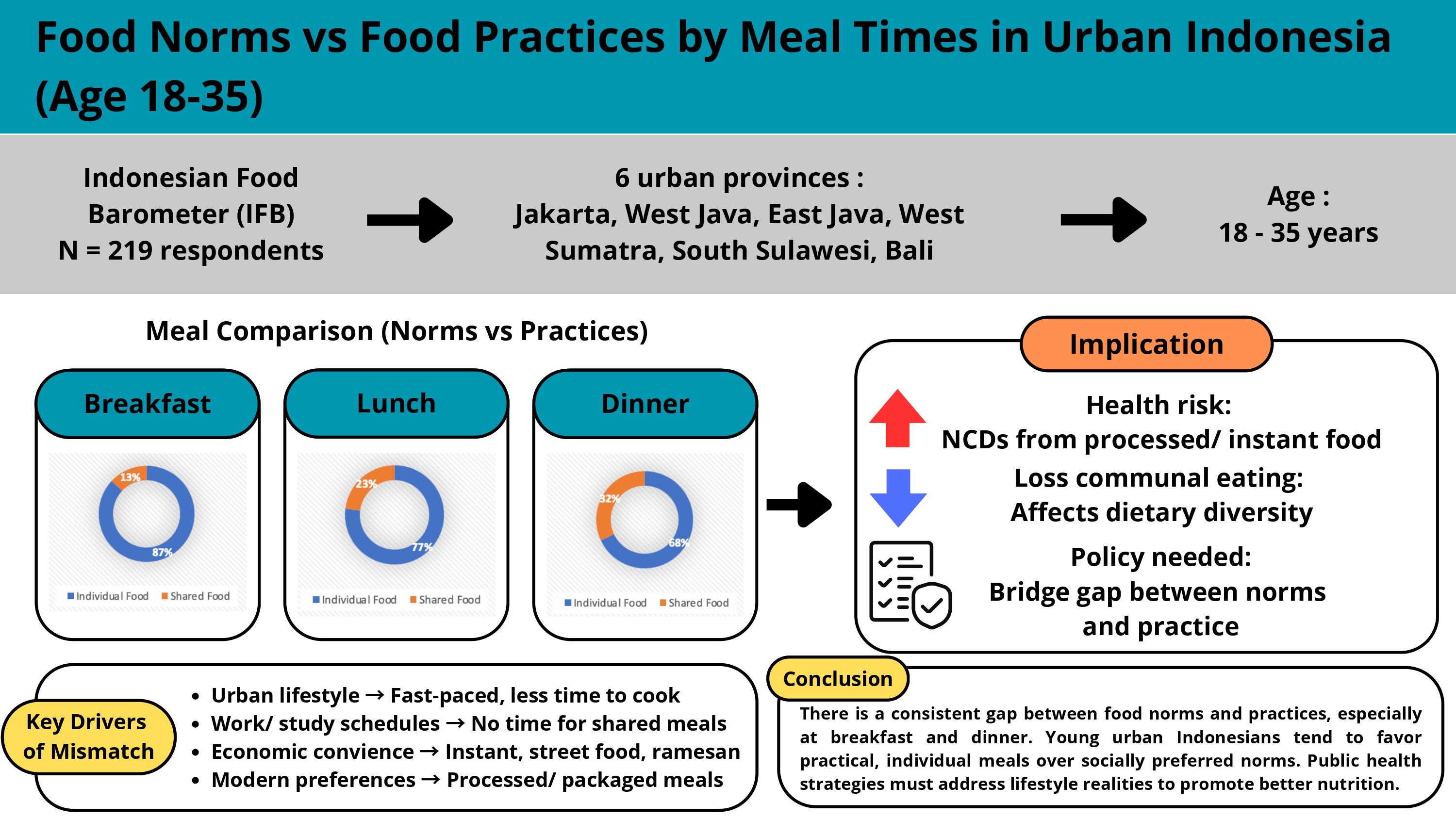PENGARUH INTERVENSI GIZI MULTIKOMPONEN PADA GURU, ORANG TUA DAN SISWA SEKOLAH DASAR TERHADAP PENGETAHUAN, SIKAP DAN KETERSEDIAAN BUAH SAYUR DI RUMAH<br><i>[Effect of Multicomponent Nutrition Intervention on Teachers, Parents, and Elementary School Students towards Knowledge, Attitude and Availability of Fruits and Vegetables at Home]</i>
Downloads
Barkley, Z. R. (2012). An educational intervention to increase fruit and vegetable consumption in parents of obese and overweight children
(Unpublished master's dissertations). University of Florida, Florida, United States.
Bergsma, E. W, Langenberg, G., Brandsma, R., Oort, F. J., & Bogels, S. M. (2014). The effectiveness of a school-based mindfulness training as a program to prevent stress in elementary school children. Mindfulness,
(3), 238–248, doi:10.1007/s12671-012-0171-9.
Bestari, G. S., & Pramono, A. (2014). Pengaruh edukasi gizi menggunakan media buku cerita bergambar terhadap perubahan
konsumsi buah dan sayur anak di Paud Cemara, Semarang. Journal of Nutrition College. 3(4), 918-924.
Badan Pusat Statistik. (2015). Kabupaten Nganjuk dalam angka tahun 2015. Nganjuk: Badan Pusat Statistik
Briawan, D., Ekayanti, I., & Koerniawati, R. D. (2013). Pengaruh kampanye sarapan sehat terhadap perubahan pengetahuan, sikap dan kebiasaan sarapan anak sekolah dasar di Kota Bogor. Jurnal Gizi dan Pangan. 8(2), 115-122. doi: http://dx.doi.org/10.25182/jgp.2013.8.2.115-122
Chien, N., Harbin, V., Goldhagen, S., Lippman, L., & Walker, K. E. (2012). Encouraging the development of key life skills in elementary school-age children: a literature review and recommendations to the tauck family foundation. Retrieved from https://childtrendsciw49tixgw5lbab.stackpathdns.com/wpcontent/uploads/2013/06/2012-28KeyLifeSkills.pdf
Chitra, U., & Reddy, C. R. (2006). The role of breakfast in nutrient intake of urban school children. Public Health of Nutrition, 10(1),
-58. doi:10.1017/S1368980007219640.
Contento, I. R. (2011). Nutrition education:linking research, theory, and practice (2nd ed.). USA: Jones and Bartlett Publishers. LLC.
Cribb, V. L., Jones, L. R., Rogers, I. S., Ness, A. R., & Emmett, P. M. (2011). Is maternal education level associated with diet in 10-year-old children? Public Health of Nutrition, 14(11), 2037-2048. doi:10.1017/S136898001100036X.
Davis, P. M. (2014). Cognition and learning: a review of the literature withreference to ethnolinguistic minorities. SIL e-Books (SILEB).
Dollahite, J., Hosig, K. W., White, K. A., Rodibaugh, R., & Holmes, T. M. (1998). Impact of a school-based community intervention program on nutrition knowledge and food choices in Elementary School Children in the Rural Arkansas Delta. Journal of Nutrition and Education Behavior, 30(5), 289-301.
Edelman, C. L., & Mandle, C. L. (2006). Health promotion throught the lifespan. (6th ed.). St. Louis: Mosby Inc.
Evans, C. E. L., Christian, M. S., Cleghorn, C. L., Greenwood, D. C., & Cade, J. E. (2012). Systematic review and meta-analysis of school-based interventions to improve daily fruit and vegetable intake in children aged 5 to 12 year. American Journal Clinic Nutrition, 96(4), 889-901.
Fernandez-Alvira, J. M., Mouratidou, T., Bammann, K., Hebestreit, A., Barba, G., Sieri, S., ... Moreno, L. A. (2012). Parental education and frequency of food consumption in European children: the IDEFICS study. Public Health of Nutrition, 16(3), 487-498. doi:10.1017/S136898001200290X.
Fitriana, N., Madanijah, S., & Ekayanti, I. (2015). Analysis of media use in the nutrition on knowledge, attitude and practice of the breakfast habits on elementary school students. Pakistan Journal of Nutrition, 14(6), 335-345. doi: 10.3923/pjn.2015.335.345.
Harjian-Tilaki, K. O., Sajjadi, P., & Razavi, A. (2011). Prevalence of overweight and obesity and associated risk factors in urband primary-school children in Badol, Islamic Republic of Iron. East Medical Health Journal, 17(2), 109-114
Hayati, M. (2009). Pengaruh peer edukasi tentang jajanan sehat terhadap perilaku anak usia sekolah di Kota Lhokseumawe-Provinsi
Nanggroe Aceh Darussalam (Thesis). Universitas Indonesia. Depok, Indonesia
Keihner, A. J., Meigs, R., Sugerman, S., Backman, D., Garbolino, T., & Mitchell, P. (2011). The power play! campaign's school idea & resource kits improve determinants of fruit and vegetable intake
and physical activity among fourth- and fifth-grade children. Journal of Nutrition and Education Behavior, 43(4), 122-129. doi: 10.1016/j.jneb.2011.02.010.
Kementerian Kesehatan RI. (2007). Laporan nasional riset kesehatan dasar (Riskesdas) 2007. Jakarta (ID): Badan Penelitian dan Pengembangan Kesehatan.
Kementerian Kesehatan RI. (2013). Laporan Nasional Riset Kesehatan Dasar (RISKESDAS) 2013. Jakarta: Badan Penelitian dan Pengembangan Kesehatan.
Kustiyah, L. (2005). Kajian pengaruh intervensi makanan kudapan terhadap peningkatan kadar glukosa darah dan daya ingat anak
sekolah dasar (Disertasi), Institut Pertanian Bogor, Bogor, Indonesia.
Lock, K., Joceline, P., Louise, C., & Martin, McK. (2005). The global burden of disease attributable to low consumption of fruit and
vegetables: implications for the global strategy on diet. Bulletin World Health Organization, 83(2), 100-108. doi: /S0042- 96862005000200010.
Mittmann, S., Austel, A., & Ellrot, T. (2014). Determinants of fruit and vegetable consumption in primary school children. Ernahrungs Umschau, 61(8), 124–129. doi: 10.4455/eu.2014.022. [NHMRC] National Health and Medical Research Council. 2013. Australian dietary guidelines. Canberra: National Health and Medical Research Council.
Noh, J. W., Kim Ye Oh, I. H., & Kwon, Y. D. (2014). Influences of socioeconomic factors on childhood and adolescent overweight by
gender in Korea:cross-sectional analysis of nationally representative sample. BMC Pulic Health, 14(1), 324-330. doi:10.1186/1471-2458-14-324.
Notoatmodjo. 2010. Promosi kesehatan, teori dan aplikasi. Jakarta : Rineka Cipta.
Oshagh, M., Danaei, S. M., Ghahremani, Y., Pajuhi, N., & Boushehri, S. G. (2011). Impact of an educational leaflet on parents'knowledge and awareness of children's orthodontic problems in Shiraz. East Medical Health Journal, 7(2), 121-125.
Prelip, M., Janni, K., Chan Le, T., Jennifer, T. E., & Wendelin, S. (2012). Evaluation of a school-based multicomponent nutrition education program to improve young children's fruit and vegetable consumption. J Nutr Educ Behav. 44(4):310-318. Doi:10.1016/j.jneb.2011.10.005.
Sediaoetama, A. (2008). Ilmu gizi untuk mahasiswa dan profesi. Jakarta (ID): Dian Rakyat.
Sulistyoningsih (2011). Gizi untuk kesehatan ibu dan anak. Yogyakarta: Graha Ilmu.
Verawati B. (2015). Pengaruh pangan sumber serat dan olahraga pada siswa obes SDIT Bogor yang mendapat intervensi pendidikan gizi terhadap status gizi (Thesis), Institut Pertanian Bogor, Bogor,
Indonesia
Wall, D. E., Least, C., Gromis, J., & Lohse, B. (2012). Nutrition education intervention improves vegetable-related attitude, selfefficacy, preference, and knowledge of fourth-grade students. Journal School of Health, 82(1), 37-43. doi: 10.1111/j.1746-1561.2011.00665.x
Yabanci, N., Kisac, I., & Karakus, S. S. (2014). The effects of mother's nutritional knowledge on attitudes and behaviors of children about nutrition. Procedia-Social Behaviour Sciences, 116(1), 4477-4481.
doi: 10.1016/j.sbspro.2014.01.970.
Yuliana. (2007). Pengaruh penyuluhan gizi dan stimulasi psikososial terhadap pertumbuhan dan perkembangan anak usia prasekolah (Disertasi). Institut Pertanian Bogor, Bogor, Indonesia
- MEDIA GIZI INDONESIA Journal is the copyright owner of all materials published on this website.
- The formal legal provisions for access to digital articles of this electronic journal are subject to the terms of the Creative Commons Attribution-NonCommercial-ShareAlike license (CC BY-NC-SA 4.0), which means that MEDIA GIZI INDONESIA Journal and readers reserve the right to save, transmit media / format, manage in database, maintain, and publish articles as long as it continues to include the name of the Author.
- Printed and published print and electronic manuscripts are open access for educational, research and library purposes. In addition to these objectives, the editorial board shall not be liable for violations of copyright law.


2.png)















